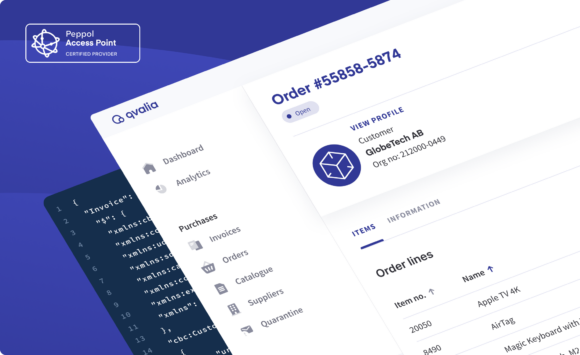Transactions, technologies and trends
Category: E-order management
E-orders, short for “electronic orders,” refer to the digitization and automation of the order management process in various industries. In traditional business operations, orders were often communicated through manual paperwork or phone calls, leading to potential errors, delays, and inefficiencies. E-orders revolutionize this process by leveraging electronic platforms and technologies to enhance accuracy, speed, and overall productivity.
Through e-ordering systems, businesses can electronically submit, process, and track orders in real-time. This eliminates the need for physical paperwork and reduces the likelihood of miscommunication, resulting in fewer errors and faster order fulfillment. E-orders can be initiated by customers, distributors, or partners through networks such as Peppol, via web portals, mobile apps, or integrated systems, making the ordering process more convenient and accessible.
Key benefits of adopting e-orders include:
Accuracy: Electronic systems reduce the risk of manual data entry errors, ensuring that the order details are accurately captured and transmitted.
Efficiency: E-Orders streamline the entire ordering workflow, reducing the time and effort required to process orders, generate invoices, and manage inventory.
Real-time Tracking: Both buyers and sellers can track the status of orders in real-time, providing transparency and allowing for proactive problem-solving.
Inventory Management: E-Orders often integrate with inventory management systems, enabling businesses to maintain optimal stock levels and minimize overstock or understock situations.
Cost Savings: The reduction in paperwork and manual processing can lead to significant cost savings in terms of paper, printing, and labor.
Enhanced Customer Experience: Faster order processing and accurate deliveries contribute to improved customer satisfaction and loyalty.
Data Insights: E-Order systems can generate valuable data insights, helping businesses identify trends, customer preferences, and areas for operational improvement.
As businesses continue to embrace digital transformation, e-orders play a pivotal role in modernizing and optimizing the order placement process. By automating and centralizing order management, organizations can enhance their competitiveness, improve customer relationships, and drive growth in the dynamic landscape of the digital age.
Explore our content on e-order management.

In procurement, the evolution towards a broader spectrum of standardized business messages marks a significant shift towards efficiency and digital integration.

To move forward with digital transformation in e-procurement, enhancing the quality of financial data stands as a cornerstone for achieving efficiency through speed, automation, and insightful analytics. Here’s why you need structured data in your e-procurement processes.

As one of the initial access points, Qvalia has achieved Peppol service provider accreditation in Finland, ahead of the upcoming national mandate for electronic orders.

You have already adopted e-invoicing, but what’s next? New technology can transform sales and purchase processes, e-procurement, and B2B e-commerce.

Our latest guide provides insights to transform sales and procurement processes and B2B e-commerce through electronic orders. Download it for free.
